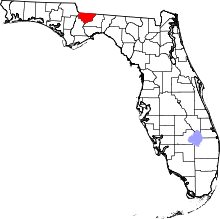Dogtown, Florida
| Dogtown, Florida | |
|---|---|
| Unincorporated community | |
 Location in Gadsden County and the state of Florida | |
| Coordinates: 30°40′44″N 84°30′12″W / 30.67889°N 84.50333°WCoordinates: 30°40′44″N 84°30′12″W / 30.67889°N 84.50333°W | |
| Country |
|
| State |
|
| County | Gadsden |
| Elevation | 89 m (292 ft) |
| Time zone | Eastern (EST) (UTC-5) |
| • Summer (DST) | EDT (UTC-4) |
| GNIS feature ID | 295245[1] |
Dogtown is an unincorporated community in Gadsden County, Florida, United States.[1] It is located 1.3 mi (2.1 km) south of the Florida-Georgia state line, along County Road 159.
A portion of a geologic clay formation found in North Florida called the Torreya Formation is exposed near Dogtown, and two mines were located there. The Douglas Owens Mine, as well as the La Camelia Mine, owned by Engelhard Minerals and Chemicals Corporation, mined resources from an outcrop of the Torreya Formation known as the "Dogtown Member".[2][3] Fossils of Carcharodon hastalis, a shark which existed from the early Miocene through early-late Pliocene (about 20 to 3 million years ago), have been found at the La Camelia Mine.[4]
The Greenshade African Methodist Episcopal Church is located on County Road 159 in Dogtown,[5] and the Owens Cemetery is located along Dogtown Road.[6]
References
- 1 2 "Dogtown". Geographic Names Information System. United States Geological Survey.
- ↑ Maxwell, E.L. (1970). "Mineral Producers in Florida, 1968" (PDF). Florida Department of Natural Resources.
- ↑ Huddlestun, Paul F. (1988). "A Revision of the Lithostratigraphic Units of the Coastal Plain of Georgia: The Miocene through Holocene" (PDF). Georgia Department of Natural Resources.
- ↑ Rojas, Alexis (September 4, 2013). "Fossil Species of Florida". Florida Museum of Natural History.
- ↑ "Greenshade AME Church". Church Angel. Retrieved July 2014. Check date values in:
|access-date=(help) - ↑ "Owens Cemetery". Find A Grave. Retrieved July 2014. Check date values in:
|access-date=(help)
